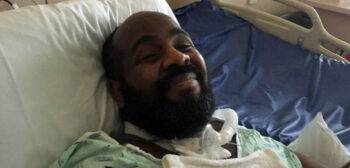By Mark Ellis —

Physicians withheld nutrition and hydration for six days from Michael Hickson, a 46-year-old quadriplegic COVID-19 patient, resulting in his death at a Texas hospital on June 11th.
His wife, Melissa, says St. David’s South Austin Medical Center refused to treat his illnesses because of his disability. His passing leaves five children fatherless.
Melissa was not told of his death until the next morning after his remains had already been transported to a funeral home without her permission, according to The Texan.
Michael Hickson became quadriplegic after a sudden heart attack while driving Melissa to work in May 2017. Melissa and their five children stayed by Michael’s side throughout his recovery.
“Michael is a faith believer, and God has spared his life for a purpose,” she posted after the tragic, life-altering event in 2017. “The medical community has given up hope, but God promised complete restoration for Michael.”
He landed back in the hospital June 2nd after contracting COVID-19 and pneumonia from a staff member at his nursing home. He was admitted to the ICU the next day.
On June 5th, Melissa was told her husband was not doing well and that she should come to the hospital to visit him. When she arrived, they wouldn’t let her enter his room, but allowed her to Face Time with him from the hallway, according to The Texan.
He was still responsive and puckered his lips when she asked, “Can I get a kiss?” He nodded yes when she said she wanted to pray for him.
On June 6th, she was told by the hospital that he was moved out of ICU, was stable and breathing on his own, and hospice would be calling her.
Melissa was shaken by this news, wondering why he would need to go on hospice if he was stable and recuperating.
The hospice rep assured her he could still receive nutrition and fluids through his percutaneous endoscopic gastrostomy (PEG) tube.
However, the hospital nurse with whom Melissa spoke contradicted that. She said that Michael would not be receiving nutrition or hydration and that he would not be resuscitated.
In a conversation Melissa recorded, the attending physician leveled with Melissa:
“So as of right now, his quality of life — he doesn’t have much of one,” the attending doctor told her.
“What do you mean? Because he’s paralyzed with a brain injury, he doesn’t have quality of life?” she asked.
“Correct,” the doctor replied.
Melissa was unable to speak to her husband again after June 6th. She requested Face Time visits with him while trying frantically to work on getting him adequate care. On June 11th, she sent an email asking for an update on his condition.
On the morning of June 12th, the hospice group called her to inform her that Michael had died the previous evening and asked if she’d like the name of the funeral home where his body had been taken.
“No one has offered condolences,” she told The Texan. “There has never been an apology or acknowledgment of his death. It’s like they just don’t care,” she said.
A spokesperson for St. David’s South Austin Medical Center provided the following statement to The Texan, “The loss of life is tragic under any circumstances. In Mr. Hickson’s situation, his court-appointed guardian (who was granted decision-making authority in place of his spouse) made the decision in collaboration with the medical team to discontinue invasive care. This is always a difficult decision for all involved. We extend our deepest sympathies to Mr. Hickson’s family and loved ones and to all who are grieving his loss.”



